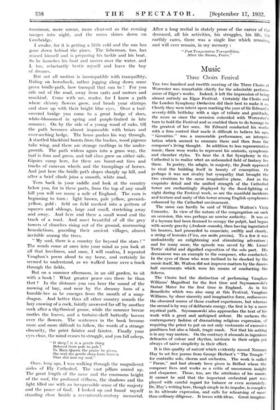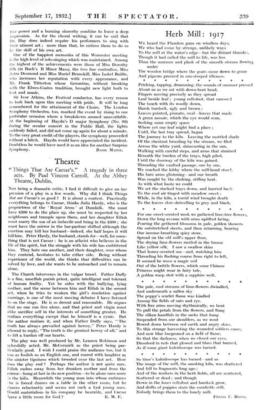Music Three Choirs Festival
THE two hundred and twelfth meeting of the Three Choirs at Worcester- was remarkable chiefly for the admirable perform- ances of Elgar's works. Indeed, it left the impression of being almost entirely an Eiger Festival. Certainly the Choirs and the London Symphony Orchestra did their best to make it so. Clearly they were intent upon marking the year of Sir Edward's seventy-fifth brithday with a sign of tribute and gratitude, the more so since the occasion coincided with Worcester's turn to hold the Festival and so enabled them to do homage to the greatest of her sons. Sir Edward conducted his works with a firm control that made it difficult to believe his age.
Gerontius " was a memorable performance, an interpre- tation which seemed to emanate there and then from the' composer's living thought. In addition to less representative music, there were works to represent his oratorio, symphonic and chamber styles. To hear the A flat Symphony in the Cathedral is to realize what an unbounded field of fantasy lies there. In poetry, the adagio, in majesty, the finale appeared to rival the building itself in beauty of conception. Or perhaps it was not rivalry but sympathy that brought the two creations to the same imaginative plane. Just as the exquisite detail and the unified strength of the Cathedral tower are enchantingly displayed by the flood-lighting at night during the Festival week, so are the manifold incidents and texture and unity of this tower among English symphonies enhanced by the Cathedral environment.
The same can hardly be said of William Walton's Viola Concerto. In view of the nature of the congregation on such an occasion, this was perhaps an unwise audacity. It was as if a layman had beenlicensed to occupy the pulpit, had begun with seemly gravity (Andante comodo), then having ingratiated his hearers, had proceeded to enunciate, swiftly and clearly, a string of heresies (Vivo, con motto preciso). To a few it was undoubtedly an enlightening and stimulating adventure ; and for many more, the episode was saved by Mr. Lionel Tertis' skilful and dignified exposition of the solo part. His demeanour was an example to the composer, who conducted. In the eyes of those who were inclined to be shocked by the music itself, Mr. Walton did not improve matters by the dance- hall movements which were his means of conducting the Scherzo.
The Choirs had the distinction of performing Vaughan Williams' Magnificat for the first time and Szymanowski's Stabat Mater for the first time in England. As in his Benedicite which was also sung at this Festival, Vaughan Williams. by sheer sincerity and imaginative force, rediscovers the obscured source of those exalted experiences, but whereas the second is by way of deliberate energy, the first is by a more mystical path. Szymanowski also approaches the text of his work with a great and unfeigned ardour. He eschews the contemporary fashion of dramatising religious expression, of requiring the priest to put on not only vestments of excessive gaudiness but also a blank, tragic mask. Not that his setting is in any way austere. On the contrary it abounds in ingenious delicacies of colour and rhythm, intricate in their origin yet always of naive simplicity in their effect.
It is this quality of naivete which evidently moved Norman Hay to set five poems from George Herbert's " The Temple " for contralto solo, chorus and orchestra. The work is called " Paean," and had already been given in Belfast where the composer lives and works as a critic of uncommon insight and eloquence. Those, too, are the attributes of his music. It cannot be said that the important orchestral part was played with careful regard for balance or even accurately. Dr. Hay's writing here, though simple in its impulse, is complex in its ultimate expression, and calls for rehearsing of more than ordinary diligence. It teems with ideas. Great imagine- tive power and a burning sincerity combine to leave a deep impression. As for the choral writing, it can be said that Dr. Hay does indeed require his performers to sing with their utmost art ; more than that, he entices them to do so by the skill of his own art.
One of the happiest memories of this Worcester meeting is the high level of solo-singing which was maintained. Among the highest of the achievements were those of Miss Dorothy Silk (in Bach's B Minor Mass), the two fine contraltos, Miss Astra Desmond and Miss Muriel Brunskill, Miss Isobel Baillie, who increases her reputation with every appearance, and Mr. Frank Titterton whose Gerontius, without breaking with the Elwes-Coates tradition, brought new light both to text and music.
Sir Ivor Atkins, the Festival conductor, has every reason to look back upon this meeting with pride. It will be long remembered for the attainment of the Choirs. The London Symphony Orchestra, too, marked the event by rising to one particular occasion where a breakdown seemed unavoidable. At the beginning of Haydn's D major Symphony (No. 93) during the secular concert in the Public Hall, the lights suddenly failed, and did not come up again for about a minute. To the very great credit of the players, the symphony proceeded 'without a hitch. Haydn would have appreciated the incident. Doubtless he would have used it as an idea for another Surprise































 Previous page
Previous page